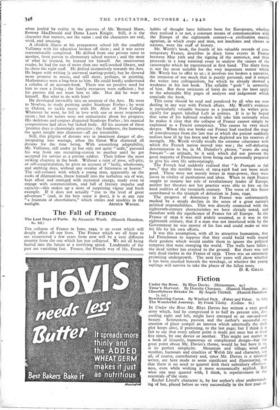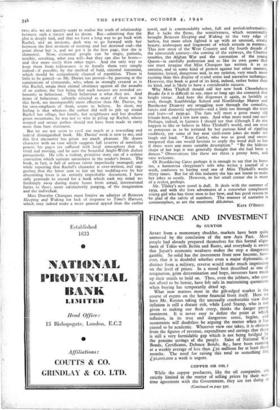Fiction
Under the Rose. By Rhys Davies. (Heinemann. 9s.) Bewildering Cares. By Winifred Peck. (Faber and Faber. 7s. 6d.) The Wonderful Journey. By Frank Tilsley. (Collins. 8s.)
IN Under the Rose Mr. Rhys Davies has written a very good story which, had he compressed it to half its present size, dis- carding right and left, might have emerged as an out-and-out beauty. Seriousness, passion and the author's successful re- creation of place compel an interest which admittedly the dark plot keeps alive, if protesting, to the last page; but I think it is fair to say that every salient point is made pot once but at least five times, by one device or another. This might not matter in a book of leisurely, humorous or complicated design—but the great point about Mr. Davies's theme, would he but have it so, is its perfect simplicity. Mountain and village, wind and weather, humours and cruelties of Welsh life and character, arc all, of course, contributory and, since Mr. Davies is a talented writer, are here made to seem significant and illuminating, so that there is no need to quarrel with their subsidiary effective- ness, even while wishing it more economically applied. But what one may quarrel with, I think, is repetitiveness in the essentials of' the story. Rachel Lloyd's character is, by her author's clear understand- ing of her, placed before us very successfully in the first page or two; also we are quickly made to realise the truth of relationship between such a nature and its doom. But—admitting that the plot is deeply laid, and that we have a long way to go back with Rachel, and an intricate, dark way to go forward with her between the first moment of meeting and her destined end—the point about her is, and we got it in the first page, that she is elemental. Now, elemental people can be tragic, pathetic, terrible, revolting, what you will—but they can also be bores— and that more easily than other types. And the only way to keep them from tediousness is to handle them very simply indeed—if possible, by the method of bald, external statement, which should be scrupulously cleaned of repetition. There is little to be gained—as Mr. Davies has proved—by guessing at the ruminations of elementals, who, when as strongly created as is this Rachel, retain their animal obstinacy against all the assaults of an author; the fact being that such natures are revealed co- herently in behaviour. Their behaviour is what they are. And items of behaviour, saliently selected as many of them are in this book, are incomparably more effective than Mr. Davies, by his over-emphasis of them, seems to believe. In short, my feeling is that whereas . the author did well to pile up round Rachel her village, her family, her neighbours and her desolate green mountains, he was not so wise in piling up Rachel, whose warped and savage pathos should not have been made to carry more than bare statement.
But let me not seem to cavil too much at a rewarding and indeed distinguished book. Mr. Davies' work is new to me, and this first encounter has given me much pleasure. He draws character with an case which suggests full reserves of novelistic power; his pages are suffused with local atmosphere that is vivid and moving, and he uses the beautiful Anglo-Welsh dialect persuasively. He tells a violent, primitive story out of a serious conviction which sustains uneasiness in the reader's breast. The book, in fact, is full of serious talent imperfectly managed; and while repeating that Rachel's character is over-written, and sug- gesting that the letter sent to her on her wedding-eve by her absconding lover is an entirely improbable document, I have only gratitude to record for a book which took my mind re- freshingly away during many hours from actual, international furies to those, more satisfactorily purging, of the imagination and the individual.
Miss Dorothy Charques must forgive an admirer of Between Sleeping and Waking for lack of response to Time's Harvest, which, may indeed make a more general appeal than the earlier novel, and is commendably sober, full and period-informative. But it lacks the flame, the sensitiveness, which occasionally brought Between Sleeping -and Waking to the very edge of bathos, but more often lighted it up with an unusual, erratic beauty, arabesques and fragments of which remain in memory. This new story of the West Country and the fourth decade of the nineteenth century—the coming of the railways, the Chartist troubles, the Afghan War and the coronation of the young Queen—is carefully pedestrian and so like its own genre that one must imagine that Miss Charques has written it as an exercise, and in some kind of protest against her other manner, feminine, lyrical, dangerous and, in my opinion, very much more exciting than this display of scund sense and narrative technique. However, this book is good of its kind, indeed, rather better than its kind, and is likely to have a considerable success.
Why Miss Thirkell should call her new book Cheerfulness Breaks In it is difficult to say, since so long ago she cornered that bright virtue. And here she dispenses it again, as lavishly as ever, though Southbridge School and Northbridge Manor and Barchester Deanery are struggling now through the comedies, farces and domestic upheavals—and a little too through the tears and fears—of 1939-40. The fans will meet a great many old friends here, and a few new ones. And what more need one say? Perhaps, indeed, in fairness I should say that although I do not happen to like or believe in Miss Thirkell's world, and am even so pompous as to be irritated by her curious kind of rippling snobbery, yet some of her neat sixth-form jokes do make me laugh out loud. " Kate Carter, who was so good and sweet- tempeted that one would hesitate to apply the word dull to her if there were any more suitable description." "By the hideous shape of her legs it was generally thought that she had been a dancer." Observations like these are three a penny here, and very welcome.
Of Bewildering Cares perhaps it is enough to say that its hero- ine, a humorous clergyman's wife who writes a journal of a week, confesses to having read one of Miss Thirkell's works thirty times. But for all this industry she has not learnt to make her jokes as neatly. However, in her small corner she is more of a realist, perhaps.
Mr. Tilsley's new novel is dull. It deals with the summer of 1939, and with the love adventures of a somewhat complacent young girl who has three men to her bow, and has good reason to
• be glad of the safety of numbers. The manner of narrative is commonplace, as are the emotional dilemmas. KATE O'BRIEN.



























 Previous page
Previous page